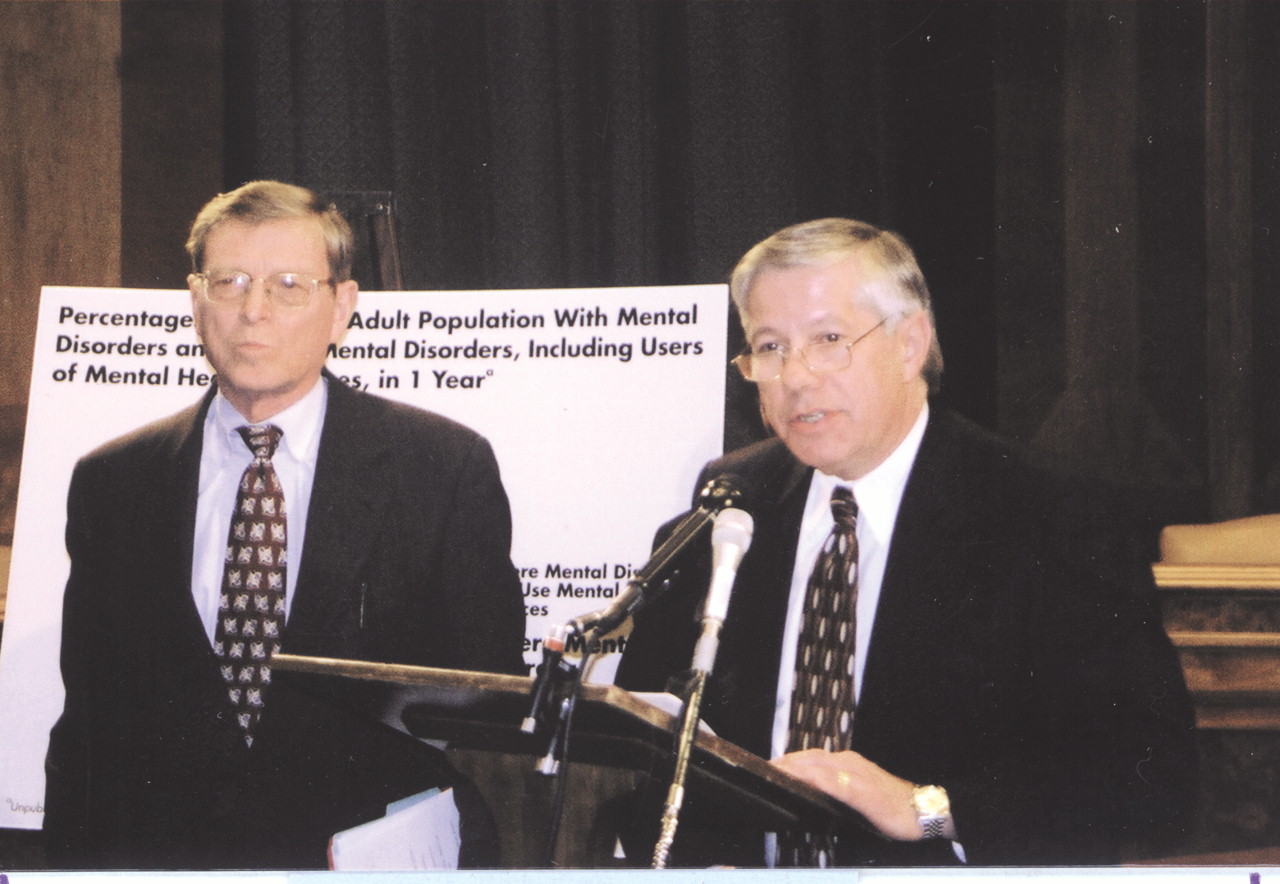APA Applauds Introduction Of Mental Health Parity Bill

APA Medical Director Steven Mirin, M.D. (right), calls for an end to “the discrimination that denies adequate insurance coverage to people with mental illness” at a press briefing last month on a new parity bill. At left is Sen. Pete Domenici (R-N.M.), who is cosponsoring the bill with Sen. Paul Wellstone (D-Minn.).
“The Mental Health Equitable Treatment Act of 2001 says loudly and clearly to Congress and our nation that the time has come to end the discrimination that denies adequate insurance coverage to people with mental illness,” said APA Medical Director Steven Mirin, M.D., at a briefing last month on Capitol Hill.
APA is a member of the Coalition for Fairness in Mental Illness Coverage, which strongly supports comprehensive parity. Other members are the American Managed Behavioral Healthcare Association, American Medical Association, American Psychological Association, Federation of American Hospitals, National Alliance for the Mentally Ill, National Association of Psychiatric Health Systems, and the National Mental Health Association.
The bill, S 543, was introduced by Senators Pete Domenici (R.-N.M.) and Paul Wellstone (D-Minn.). It improves upon their landmark 1996 Mental Health Parity Act, which prohibits only annual and lifetime dollar limits on treatment for mental illness that are different from those for physical illnesses.The bill had 12 cosponsors at press time. If enacted, the new parity legislation would replace the 1996 law, which is due to sunset in September.
The companion bill in the House of Representatives, the Mental Health and Substance Abuse Act (HR 162), was introduced in January by Rep. Marge Roukema (R-N.J.), which at press time had 60 cosponsors (Psychiatric News, February 2). Roukema was a sponsor of the 1996 Mental Health Parity Act.
The General Accounting Office, the investigative arm of Congress, reported last year that the 1996 law was not having a significant impact on mental health benefits because of unanticipated loopholes. Group health plans found new ways to circumvent parity coverage of mental illness, including limiting the number of inpatient and outpatient days for mental health treatment.
“While there may be adherence to the letter of the law, there are certainly violations of the spirit of the law,” said Domenici at the briefing. Group health plans continue to use discriminatory copays, deductibles, and coinsurance amounts for mental health treatment, he explained.
The 2001 bills, unlike the 1996 parity law, do not exempt employers that show that their annual costs of compliance exceed 1 percent, according to the legislation.
The National Advisory Mental Health Council estimated in a report to Congress last year that mental health parity should not increase premiums by more than 1 percent.
The 2001 Senate bill also exempts employers with 25 or fewer employees rather than 50 or fewer, as in the 1996 law.
Domenici and Wellstone introduced a similar mental health parity bill in 1999 that applied to the coverage of treatment for “severe biologically based mental illnesses.” The 2001 version applies to all mental illnesses and conditions in DSM-IV-TR or the latest DSM version.
Wellstone commented that group health plans in the private sector are lagging behind those participating in the Federal Employee Health Benefits Plan (FEHBP), which implemented comprehensive parity in January. The parity bill is modeled on provisions for the FEHBP.
Like the 1996 parity law, the bill would supercede only weaker state parity laws. There are currently about 33 state parity laws with about 15 modeled on the 1996 law, according to the National Alliance for the Mentally Ill.
Although President George W. Bush signed a limited parity bill into law in 1998 in Texas as governor, it remains to be seen how supportive he will be of the federal parity bill.
Wellstone was planning on introducing a substance abuse parity bill at press time.
The text of both bills can be found on the Web at thomas.loc.gov by searching on the bill number, S 543 or HR 162. ▪



